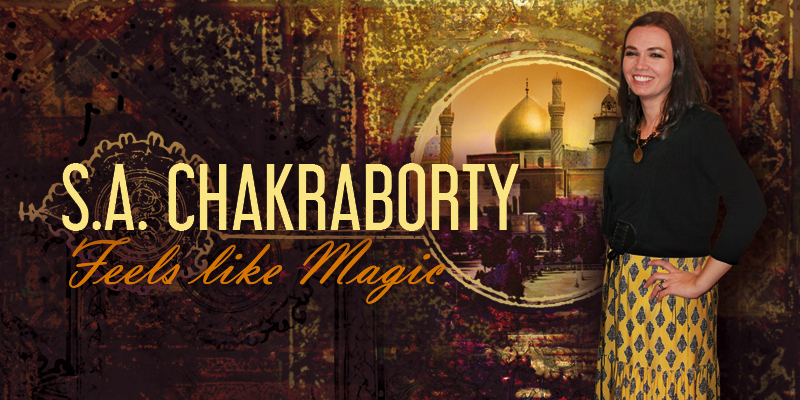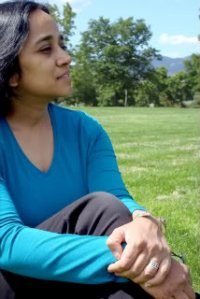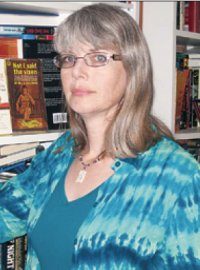S.A. Chakraborty: Feels Like Magic

SHANNON CHAKRABORTY was born December 7, 1985 in New Jersey. She studied international relations and Middle Eastern history at American University before moving to Brooklyn to work in a medical office. While working in healthcare, she joined the Brooklyn Speculative Fictions Writers group and began developing her craft with early stories set in the world that would become the Daevabad trilogy, an epic political fantasy inspired by medieval Islamic history. The first book in the trilogy, The City of Brass (2017), was a finalist for the Compton Crook, Crawford, World Fantasy, Locus, and British Fantasy awards. The second book, The Kingdom of Copper (2019) is out now, and the trilogy will conclude in the forthcoming The Empire of Gold. Chakraborty currently lives in Queens with her husband and daughter.
Excerpts from the interview:
“I was always a reader. My mom really pushed me from the time I was young. I’m from a working-class background – I was the first person to go to college in my extended family – and my parents wanted me to be educated, so they took me to libraries to make sure I had access to books and was always reading. I read science fiction and fantasy, but really I just read everything. I was that kid who would go to the library during the summer and just read all the Stephen King. Then I’d say, ‘Okay, I liked John Grisham. Now I’m reading all the John Grisham novels I can get my hands on.’ If it had a cool cover or looked interesting I’d try it. I almost regret sometimes that I read so quickly, because now I can’t think of the titles. People ask, ‘What did you like when you were a kid?’ I don’t know. I just consumed books, and now they all blend together in my head.
“I will be up front: I didn’t have a lot of experience when I started writing The City of Brass. I had no illusions that I was going to be a writer. I didn’t think I could be a writer. My family wanted me to go to college and get a good, educated person’s job. The arts did not seem like something a person like me could access. I was supposed to go to college for a serious position – I was going to be a professor or work for the government. While I wrote some fan fiction in high school, that was pretty much it, and when I started writing about the Daevabad world, which would become The City of Brass, it was one of the first creative things I’d ever seriously worked on. It’s a little scary sometimes when I think, I’m sitting here with no creative writing background, no English degree, and now here I am, an award-nominated author.
“I didn’t plan to go into health care, but I graduated college directly into the 2008 recession and needed the first job I could find. My husband was still in school; we had to pay rent and afford general life, so I applied to everything and ended up doing secretarial work in a medical office. I was there for several years, moving up to assistant manager, and it was great – one of those experiences that makes me glad I didn’t get into graduate school. It was the utter breadth of humanity. Our patient population and staff were mostly Orthodox Jews, Pakistani and Bengali Muslims, and Italian and Puerto Rican Catholics, and we were all in the office together, celebrating holidays and fighting over breaks. The stories I have from this office, I can’t even tell you. It was hard work, but at the same time, it was a very good ‘seeing-all-of-humanity’ experience – dealing with people and stories and real life issues of life and death and birth and family. I probably did better in that environment than I would have if I’d gone into academia. I was planning to go back to school for public health, but life interfered again: I began writing The City of Brass, had a baby, and now I’m here.
“I love science fiction. It’s funny, because I’m a fantasy writer, but SF was my first love, and I’m still a total sci-fi movie and TV show buff. I don’t have hard scientific knowledge, so I’m not writing SF I can show anybody yet – but maybe one day. A lot of the SF I liked and read was more overtly political. I like the idea of exploring new worlds and seeing new things – that adventuring spirit.
“I’ve loved history since I was a kid. I’d would gravitate towards different things – every year it would be something new. I’d dive into ancient Mesopotamia, then Neolithic Europe, or, with embarrassing intensity at age eleven: the Titanic. I started studying Middle Eastern history when I was in high school. I grew up outside New York City and was fifteen years old when the Twin Towers came down. I knew nothing about Islam, about the Middle East, about politics in general – and I wanted to understand what happened. It was a deeply profound shift in my life, because, absent the modern politics and security issues, I ended up feeling like the basic tenets of Islam – of which I’d known nothing growing up – quietly mirrored my own beliefs about God far better than the faith in which I’d been raised. It would also set me on the path to the historical field that has been my primary interest since: the medieval Islamicate world. I like seeing the confluence of the different cultures of the time and how they interacted. It’s fascinating to study syncretism in terms of religion, language, and storytelling traditions. That has been my love for a very long time.
“I studied abroad in Egypt when I was in college. It was an incredible experience – one that ended up changing my academic path. At that point, I was studying international relations with the idea that I would work for a nonprofit or for the government, something stable. I was taking history classes for fun, but when I was in Cairo, I got to take graduate classes in medieval history that took things to a whole different level. Actually getting to see the sites and have history re-centered and decolonialized made a huge difference. I wasn’t in the United States learning about the history of ‘those people’ – I was the American in class, keeping my mouth shut, and letting people teach their history to their students, while I was just lucky to quietly listen and learn. And what a captivating history! I left Cairo and I knew I wanted to study this for the rest of my life. Except, of course, post college life didn’t exactly go to plan.
“I made up Daevabad’s world in short stories I originally wrote for myself that I wasn’t going to show anybody. I felt like my career and life had gone wildly off plan, so I invented this fantasy world where I could spin together magic and folktales and the history I still loved. And I spent a lot of time on it – eventually even my husband asked, ‘Why are you on your computer all the time?’ So I finally let him read some and he liked it and encouraged me to show others. I joined a writing group very reluctantly, though, because I was just so terrified and apprehensive of the very idea of showing something so precious to strangers.
“Seven or eight years ago I was still living in Brooklyn, attending my local mosque, where I served as volunteer coordinator. Then the NYPD spying thing came up, and it was very frustrating because we’re just a normal community trying to do our thing. It’s not a secret to anyone that it’s difficult to be a Muslim in the United States, but I was working mostly with teens and college kids who just wanted to serve God and their community and were constantly being painted in this horrible light. Around the same time, I had read Saladin Ahmed’s Throne of the Crescent Moon, and I was just like, ‘Wait. We’re allowed to do this? We’re allowed to put these things out there?’ It was like, yes, of course! Our community deserves these sort of fun, exciting tales, and here I was sitting on this giant pan-Islamic history epic I was too shy to share?
“When I got to the point of trying to publish, I wasn’t expecting much. My first full manuscript rejection was the exact message I expected: ‘This book is too different, too complicated,’ and all the other nuanced ways of saying, ‘We are not publishing your weird Muslim fantasy book with foreign names. It was disheartening, but I was also pretty fired up at this point. I revised and edited the book as an adventure tale for fellow Muslim fantasy nerds, and I wasn’t letting go of that voice and those details.
“When I did find a publisher, they were incredibly supportive. I was so worried I was going to asked to white-wash certain characters, to cut down on religious details or non-English words, but my editor was awesome and a fighter and helped me find ways to make things clearer to readers who might not be familiar – not to take the unfamiliar things out. That attitude still crops up in reviews, or I’ll get the occasional hate-mail. But I wrote the book for other Muslim nerds, and now they say, ‘I’m writing a D&D campaign based on this!’ My heart melts. That’s who I wrote it for, so I don’t care about the rest.”
Interview design by Francesca Myman. Photo by Arley Sorg.
Read the full interview in the March 2019 issue of Locus.
 While you are here, please take a moment to support Locus with a one-time or recurring donation. We rely on reader donations to keep the magazine and site going, and would like to keep the site paywall free, but WE NEED YOUR FINANCIAL SUPPORT to continue quality coverage of the science fiction and fantasy field.
While you are here, please take a moment to support Locus with a one-time or recurring donation. We rely on reader donations to keep the magazine and site going, and would like to keep the site paywall free, but WE NEED YOUR FINANCIAL SUPPORT to continue quality coverage of the science fiction and fantasy field.








No joke but this trilogy combined with Shannon’s interviews changed my life and worldview and introduced me to so much history I was unaware of.